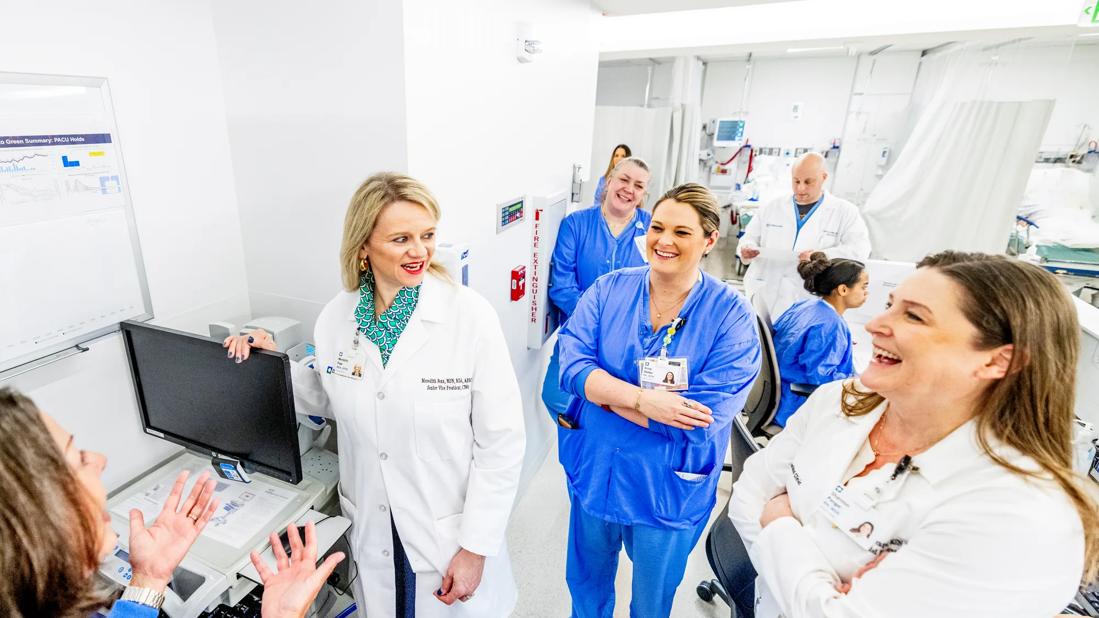Design encourages focused sharing of information

Image content: This image is available to view online.
View image online (https://assets.clevelandclinic.org/transform/0b8742a5-8068-4ce1-b670-4d7a224e8b88/NUR_5737308_03-11-25_011_LDJ)
huddle board
Some of the best minds in nursing at Cleveland Clinic recently performed deep work to refresh the professional practice model (PPM). So when the time came to disseminate the model, nursing leaders wanted to be sure it could be embedded in nurses’ day-to-day work.
Advertisement
Cleveland Clinic is a non-profit academic medical center. Advertising on our site helps support our mission. We do not endorse non-Cleveland Clinic products or services. Policy
The solution was a new white board designed to be the center of gravity for shift huddles. While white boards aren’t new, the redesigned huddle board contains the PPM graphics as well as sections for each of the four quadrants of focus. The redesign has increased engagement and created a one-stop-shop for information for everyone on the team.
Soon after the Stanley Shalom Zielony Institute for Nursing Excellence was formed in 2009, a professional practice model was developed for all Cleveland Clinic nurses.
“It’s really a framework that directs nurses with regard to ethical practice, skill development and their ongoing education,” explains Nancy DeWalt, MSN, RN, NE-BC, Magnet ®program manager at Cleveland Clinic Hillcrest Hospital.
In 2020, nurses refreshed the PPM to reflect changes in the healthcare environment, including globalization and digitization. The model also aligns with Cleveland Clinic’s strategic plan.
With that work completed, the question was how to keep the PPM front and center throughout four areas of nursing practice:
It wasn’t good enough to simply tack up a copy of the PPM, DeWalt says. The solution, derived by DeWalt and the PPM team, was a white board with quadrants dedicated to those areas and space to add information relevant to each.
“I didn’t want a piece of cardboard hanging on the wall that nobody read,” DeWalt says. “We met with groups to discuss what kind of information could be included to bring us back to the patient, the patient’s family or to a fellow caregiver. If it’s Quality and Safety, would we want to discuss the falls rate? Which patients are in most at risk of becoming injured? Or maybe there’s a safety meeting, and we add a reminder to attend.”
Advertisement
The board prompts discussions during nursing huddles, ensuring that fundamental issues stay top of mind. It helps teams see how procedures and policies fit into overall goals, and it also has a section where printed materials can be tacked for quick reference.
“I call it the ‘Nobody Told Me Board,’ because now when people are away for a few days, or they come back from vacation, they don’t have to worry that they’re left out of the loop,” DeWalt says. “It’s all on the board.”
All Cleveland Clinic nursing units are using them now, she adds.
The rollout effort reinforced the importance of each unit taking ownership of their board. DeWalt says that she and Hillcrest Chief Nursing Officer Susan Collier, DNP, RN, NEA-BC, watched a huddle on a particular unit that had integrated the board especially well. They were so impressed that they asked Hillcrest Magnet Champions to help encourage customization in all the units.
After that, DeWalt introduced a dose of competition. A team captured videos of each unit’s huddle and selected the three that were doing the best at integrating the PPM into patient care. Nurses voted to select a “fan favorite” and a runner-up.
The winning team was from coronary care unit (CCU) and cardiac surgical intensive care unit (CSICU), which combine their huddles. They added a game spinner to the board and adopted a Wheel of Fortune theme. On Fridays, CCU nurses face off against the CSICU team in a friendly competition that incorporates questions to help nurses who are preparing for critical care certification. Correctly answered questions earn points, and the team with the most points at the end of a quarter earns a free lunch.
Advertisement
Christine Humphrey, MSN, RN, assistant nurse manager at the Hillcrest CCU, came up with the Wheel of Fortune theme with Kayla Doles, assistant nurse manager of CSICU.
“I am a fun-idea person,” says Humphrey. “If there’s a way to make things fun, even for five minutes, I’m interested, because the job can be challenging.”
Humphrey was not initially enthusiastic about the board, but she was won over when she saw how much it helped communications. “Any nurse on any shift can go to that board and see what’s important — if we’re trialing anything, if there are new classes coming up, if there are EPIC upgrades or point-of-care visits. It’s all there,” Humphrey says.
Enthusiasm for the PPM huddle boards inspired some patient care nursing assistants (PCNAs) to replicate the board and the process for their own work. Clinical technician Quincean Walton says the board has helped focus her colleagues’ conversations. “We try to keep people up to date on what’s going on,” she says. “It improves professionalism because we have better information.”
The biggest advantage of the PPM huddle board is that caregiving teams decide how to interact with it. “Each unit takes this process and gives it life,” DeWalt says. “I didn’t do it for them, they do it. They incorporate what’s most important to their areas and their patient population.”
Advertisement
Advertisement
Regional organizations collaborate to address nurse faculty shortage
How wellness habits help nurses flourish
Planning continues with critical, patient-focused input from nursing teams
Strengthening care through targeted resources and frontline voices
Embracing generational differences to create strong nursing teams
CRNA careers offer challenge and reward
An unexpected health scare provides a potent reminder of what patients need most from their caregivers
Cleveland Clinic Abu Dhabi initiative reduces ICU admissions and strengthens caregiver collaboration